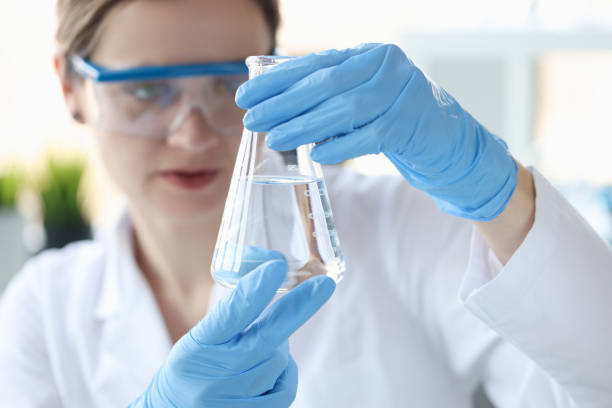Professional Well Water Testing Services: Get Accurate Results Fast
Wiki Article
Learn Just How Water Screening Can Find Contaminants and Shield Your Household's Wellness
Understanding the significance of water screening is important for guarding your family members's wellness, as our water supply can harbor hidden threats. From microorganisms to heavy steels, contaminants present severe risks, frequently undetectable without appropriate analysis. By checking out the auto mechanics of water screening, one can discover the undetectable hazards prowling in apparently beautiful water sources. Yet, just how do you determine which tests are essential for your household, and what steps should be taken when prospective dangers are disclosed? As we navigate these questions, the course to guaranteeing water security and a healthier living atmosphere ends up being more clear.Importance of Water Checking
Acknowledging the vital function water plays in sustaining life, the relevance of water testing can not be overstated. Ensuring that water is cost-free from harmful compounds is important for keeping healthy areas and environments. Water Testing Service.Water testing acts as an aggressive step to recognize prospective hazards that may compromise water high quality. Via organized analysis, it aids detect physical, chemical, and biological specifications that might posture risks to human health. Routine testing permits the early discovery of concerns, helping with prompt treatments to avoid prevalent contamination and linked wellness issues.
In addition, water screening sustains regulatory compliance, guaranteeing that water providers meet recognized security requirements and guidelines set by governmental authorities. It fosters transparency and responsibility, developing public count on the supply of water system. Testing provides useful data that educates water monitoring strategies, making it possible for sustainable use and preservation of this priceless resource.
Basically, water screening is a crucial device that safeguards public health and wellness, ensures governing adherence, and promotes the sustainable monitoring of water resources. Its relevance in securing both individuals and areas can not be underestimated.
Common Water Contaminants
Among the different components that can compromise water quality, usual water contaminants include a range of physical, chemical, and biological substances that position considerable dangers to human wellness and the environment. Physical contaminants commonly entail sediments or natural products put on hold in water, which can influence clarity and taste.Biological pollutants, mostly microorganisms, infections, and protozoa, emerge from human and animal waste going into water systems. Pathogens such as E. coli, Giardia, and Cryptosporidium are notorious for causing gastrointestinal diseases and can be especially dangerous to young kids, the elderly, and those with jeopardized immune systems. Nitrates and nitrites, commonly coming from plant foods, present one more health threat, especially to babies, possibly causing problems like methemoglobinemia or "blue infant disorder."
Furthermore, emerging pollutants, including pharmaceuticals and individual care products, have actually increased issues because of their determination and unknown lasting impacts. Understanding these contaminants is important for carrying out efficient water treatment techniques and guaranteeing safe drinking water.
Exactly How Water Screening Functions
Understanding the range of pollutants in water emphasizes the relevance of efficient testing methods to protect public wellness. Water testing is a methodical process designed to determine and measure different pollutants that could pose risks to human health and wellness.Chemical testing usually includes spectrometry or chromatography, both of which can identify and gauge specific chemical compounds. Furthermore, physical attributes like color, turbidity, and ph are evaluated to give understanding into the general high quality of the water.
The exact techniques employed in water testing depend on the particular impurities of worry and the water's meant use. By consistently using these extensive screening protocols, researchers and public health and wellness officials can ensure the safety and top quality of water, thereby securing neighborhoods from prospective wellness dangers.
Choosing the Right Examination
The first action is evaluating the water source-- be it metropolitan, well, or surface area water-- as each has distinct dangers. Community water might need screening for disinfectant byproducts, while well water might need testing for nitrates, microorganisms, and hefty steels.Following, think about ecological factors and recent occasions. Neighboring agricultural activities may require screening for pesticides and herbicides, whereas industrial areas might need checks for chemical toxins. Additionally, any adjustments in water appearance, smell, or taste ought to trigger particular testing for typical impurities like lead, chlorine, or biological microorganisms.
Specialist water screening services use comprehensive packages that target a wide variety of prospective contaminants. These kits typically straighten with criteria established by the Environmental Defense Agency (EPA) or local health departments. For an extra customized approach, talking to a water quality specialist can provide understandings right More about the author into which specific tests are needed based on regional worries and specific wellness requirements, making sure the defense of your family's wellness.

Keeping Water Security

Along with testing, correct maintenance of water supply plays an important function. This consists of servicing and examining pipes systems, tank, and septic systems to avoid leaks or backflow that can present pollutants - Water Tesing Services Tampa. Employing water filtering systems created to deal with certain neighborhood problems can even more secure versus pollutants, providing an extra layer of protection
Public understanding and education and learning are equally vital in maintaining water safety. Areas need to be this article informed concerning possible dangers connected with neighborhood water sources and the essential steps to minimize them. Urging public participation in water safety efforts fosters a cumulative obligation that enhances general efficiency.
Ultimately, a comprehensive technique that integrates normal screening, system upkeep, and community involvement is important in protecting water high quality. By doing so, families can be ensured of clean and secure water, protecting their health and health.

Conclusion
Regular water testing is necessary for recognizing pollutants such as germs, heavy metals, and chemicals that present health and wellness threats. By assessing water examples, unseen hazards can be identified, making certain the stipulation of risk-free alcohol consumption water. This positive method aids create a healthier setting and promotes educated decision-making pertaining to water safety and security. Choosing proper screening techniques and keeping watchfulness in water high quality are important action in protecting public health and wellness and ensuring the well-being of all home participants.Recognizing the relevance of water screening is essential for protecting your family's health, as our water supply can harbor hidden use this link threats.Water screening serves as a proactive step to determine potential dangers that may endanger water quality.Additionally, water screening supports governing compliance, making certain that water suppliers fulfill well established safety and security requirements and standards established by governmental authorities. Community water could require screening for disinfectant byproducts, while well water may require screening for nitrates, microorganisms, and hefty metals.
Routine water screening is an essential component in maintaining the high quality of water resources, allowing prompt treatments before pollutants get to dangerous levels.
Report this wiki page